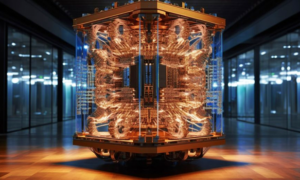Quantum Computers: This invention has already made lots of impact and will continue to change lives well into the 22nd century and beyond as it gets more advanced. Breakthroughs in many different field such as physics, medicine, scientific, nanotechnology, robotics, engineering, and speeds up the process of developing technologies exponentially. This is allowing us to crack encryption in mere seconds whereas it would take hours, days, and years. In a near future, we will be able to simulate entire observable universe within these computers and even be able to create simulations, solve challenging philosophical questions, and even be able to upload our consciousness and memories within the next century or two.

The development of AI through Deep/Machine Learning is mostly concerned with algorithms. A concept framework for AI executing algorithms is known as artificial neural network (ANN). “This allows the ability to mimic the human brain through interconnected network of neurons. One neuron can react to other neighboring neurons and create a vast network of neurons which is then able to change its state according to its divergent inputs from the environment†(Mughaz, Bouhnik, 2020). Researchers are working on applications that build off existing knowledge of algorithms into more complex systems. The researchers have created neural networks that can achieve supervised learning. This process involves where a task is to collect information of a functions that can map input to an output and vice versa. The Neural network can also learn and test data that has not been labeled or classified. It reacts by checking existing and non-existing data and then it can identify common features of new data (Mughaz, Bouhnik, 2020). The advancement of computational power has allowed neural networks to learn more complex systems and evolve overtime just like the human brain and learn on its own. The technical term for this is known as “deep learning†through which systems can learn, identify patterns, and make decisions with minimum amount of human intervention.
Once Artificial General intelligence is made, its intelligence will multiply exponentially. It will be able to solve the most complex decisions and improve its decision making skills. Ray Kurzweil says we might reach technological singularity in 21st century since human innovations and inventions will slowly decrease as artificial intelligence take over most sectors of the work-force.
Quantum computers exist today and are owned by tech giant companies such as Google, IBM, Accenture, and Baidu however, they are less powerful at 53 qubits and more restrictive in their usage compared to the ones that will operate by over 100+ qubits within the coming decades. Supercomputers are being converted into advanced supercomputers (which are basically quantum computers) due to a high powered processor. The most important and significant part of artificial intelligence will be the advance development of quantum computing. The integral areas for quantum computing are complex systems of artificial intelligence that will use algorithm to rely on processing huge amounts of complex datasets.
According to a book published by Seiki Akama, Elements of Quantum Computing, the invention of super-advanced intelligent quantum computers in the coming decades is bound to happen. Advanced quantum computing is going to change the world. The growing interest of developing quantum computer has been in public talks for more than a decade. It has attracted attention in the scientific and technical communities. Various agencies and popular presses are funding the research and development of super advanced quantum computing by programming systems of artificial intelligence algorithms (Akama, 2014). To understand quantum computing, we must first understand the concept of quantum mechanics and its important relation to quantum computers. Quantum mechanics is a physical property of nature in physics where scale of atoms and subatomic particle phenomena occurs at a micro level (Haug & Hoff, 2017).
Quantum computing uses quantum mechanical properties to operate. Today’s quantum, classical and supercomputers are nowhere near the power of future quantum computers. Many technology-based companies are investing time, money, and research in developing this type of supercomputer. Advanced Quantum computing will allow the need for better ability to learn, reason, and understand by evolving intelligent complex system of algorithms (Farahmand, Heydari, 2014). The ability to solve a problem in less than a day otherwise would take longer than the lifetime of the universe would be transformative. It cracks the strongest encryptions and cryptography of data within seconds whereas, regular classical and supercomputers would take days, months, and years (Farahmand, Heydari, 2014). Discovering new quantum algorithms is a growing active area of research among the help of scientists, engineers, and physicists. The invention of even more super advanced quantum computers opens vast opportunities to progress and advance artificial intelligence technology in almost every sector.
-Mughaz, D., Cohen, M., Mejahez, S., Ades, T., & Bouhnik, D. (2020). From an Artificial Neural Network to Teaching. Interdisciplinary Journal of E-Learning & Learning Objects, 16(1), 1–17.https://doi-org.libraryproxy.uwp.edu:2443/10.28945/4586
-Farahmand, Y., Heidarnezhad, Z., Heidarnezhad, F., Muminov, K. K., & Heydari, F. (2014). A study of quantum information and quantum computers. Oriental Journal of Chemistry, 30(2), 601–606. doi: http://dx.doi.org.libraryproxy.uwp.edu:2048/10.13005/ojc/300227
-Akama, S. (2014, May). Elements of Quantum Computing. from http://mmrc.amss.cas.cn/tlb/201702/W020170224608149203392.pdf
-Haug, E., & Hoff, H. (2017, November 10). Stochastic space interval as a link between quantum randomness and macroscopic randomness? from https://www.sciencedirect.com/science/article/pii/S0378437117310725

